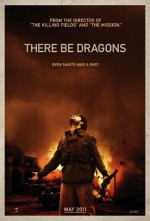There Be Dragons

The life of Saint Josemaría Escrivá, the founder of the Opus Dei movement, seems ripe for dramatization, regardless of what you may think of his accomplishments. Founded during the Spanish Civil War, Escrivá’s order and the tumultuous times it and its founder had to pass through in during its gestation make for easy conflict.
And easy conflict is what we get. Write-director Roland Joffé (The Mission, The Killing Fields) has delivered a sermon on sanctity that practically lives on the nose. Which is really strange, considering the film has gobbled up so many themes about life and death and love and forgiveness that it is also hopelessly muddled. I wouldn’t have thought those two things could possibly go together, but I was wrong.
Escrivá himself is counterpointed throughout the film by his childhood acquaintance Manolo (Wes Bentley), the son of a wealthy industrialist who has a general disregard for man and crosses Escrivá’s path from time-to-time as the Civil War erupts. Which is where the muddling comes in, because Manolo is theoretically our point-of-view character — except that he’s not; he’s telling the entire story in flashback to his estranged son (Dougray Scott) as he tries to explain why he’s been such a bastard for so long. And to put the capper on that bastardness, he makes sure to include stories about Escrivá, turning Escrivá into the point-of-view character.
There Be Dragons suffers continuously from this sort of over reach. It wants to be about so many things ultimately it’s about nothing.
It doesn’t help that each of the different segments suffers from a different level of heavy-handedness. Escrivá comes across as so saint-like through most of his dealings that it’s hard to see the actual human being inside him — a real problem for the man who made his name on the sanctity in everyday life.
And Manolo gets it even worse. When he joins the Communist side of the revolution as a spy, he becomes infatuated with a Hungarian freedom fighter (Olga Kurylenko), but rather than testing his loyalties and beliefs, she reaffirms his innate jealousy and lack of humanity by choosing another charismatic freedom fighter (Rodrigo Santoro) without giving him a second glance. Manolo quickly spirals into betrayal, and it’s difficult to care about him enough to give any notice to the film’s message (one of its many) about reconciliation.
It’s a difficult subject, and one that deserves talking about as the focus of a film, but There Be Dragons isn’t up to it.
It’s not entirely a waste of time; Joffé is too good a filmmaker for that, and there is a tremendous amount of craft on display. The central performances from Cox and Bentley are generally good, and the scenes work in and of themselves. But the focus on the individual pieces keeps them from working together to create a whole. For all of the craft involved, there’s no skill.
There’s a good movie in there somewhere, but a lack of focus keeps There Be Dragons from reaching the lofty heights it’s aiming for.



Leave a Reply